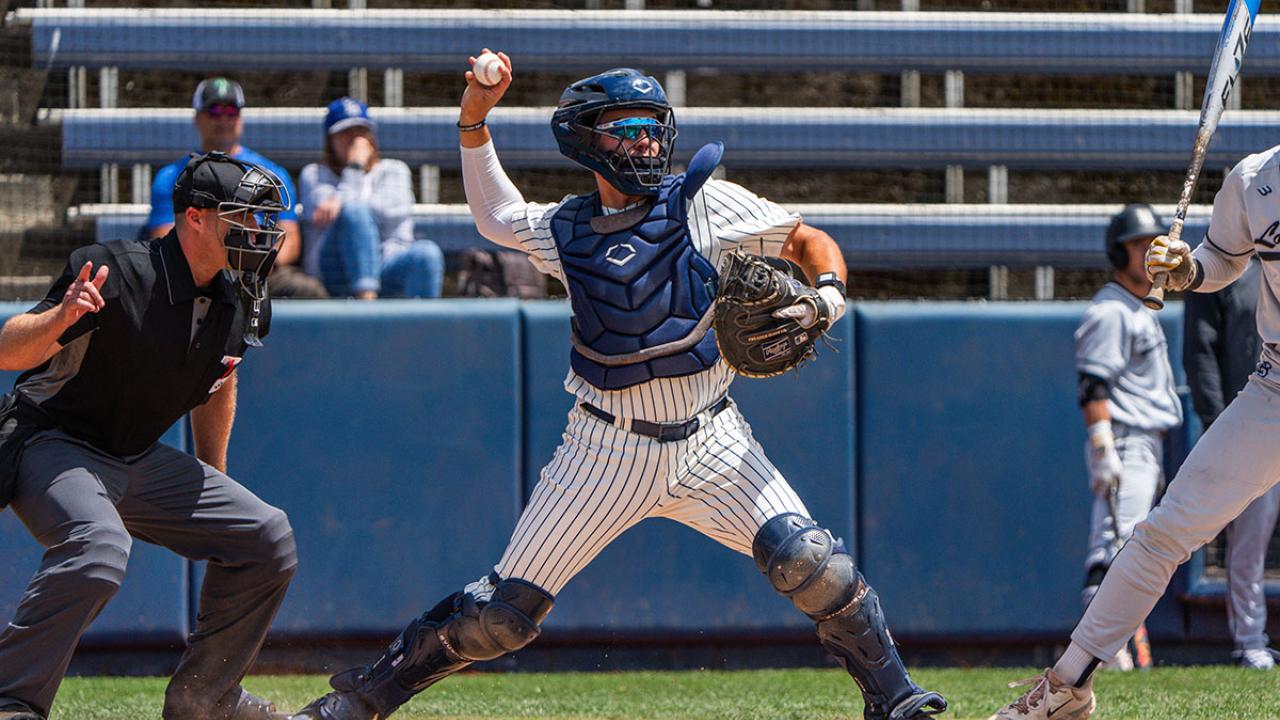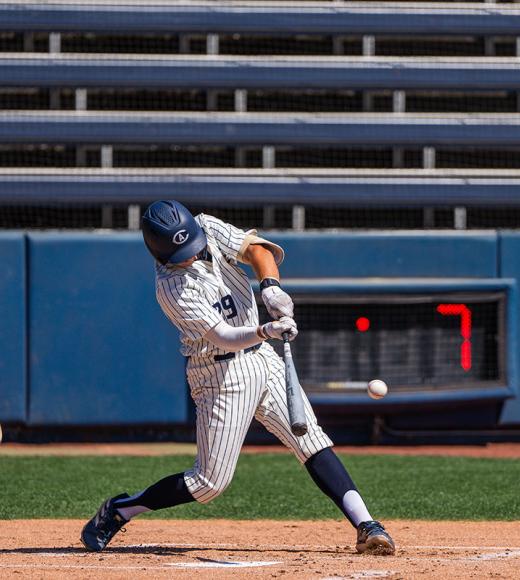
Double Play
Undergraduate Riley Acosta swings for success in computer science and on the baseball field
As a third-year computer science major at the University of California, Davis, Riley Acosta can be found designing and testing lines of code and completing group projects. When he's not busy with homework, he can be found fielding fly balls or calling plays from home base as an outfielder and catcher for the UC Davis Aggies men's baseball team.
With the Aggies just winning their first season since 2015, we caught up with the Division I athlete-slash-STEM major (during one of his few breaks) to find out where he got the playbook for this double-play lifestyle and where he sees the common thread between computer science and America's favorite pastime.
Tell us about being a baseball player at UC Davis.
I've played baseball pretty much all my life. So that's just a passion that I have above all else. I'm a catcher and an outfielder. It's Division I baseball, so it's pretty awesome being a collegiate athlete.
As the catcher, you have to be kind of like an emotional leader of the team. You also have to be able to connect to the coaches and handle the staff. I get the added bonus of catching bullpens for pitchers, so when everyone else gets off days in the fall, that's not an off day for me because we have bullpens. It is an added responsibility and then you put that on top of schoolwork and stuff. But I'm playing college baseball, and I get to do that and have the social life that I have with all my teammates.
How did you become interested in computer science?
When I was in high school, I wanted to pursue engineering in college. My high school offered two computer science AP classes. Those ended up being really interesting to me.
I like the structure of it, where there's no set-in-stone right answer. It's a lot of testing and build-up. When you first learn to code, your teachers show you all the different things you can do with it: you can build video games, you can build stuff for sports and there's new programs and technology always coming out.
How do you see baseball and computer science colliding in your life as a student?
In both baseball and computer science, having the pressure of having to perform at anything helps me. Knowing you have to perform on the tests because one test you take is 20% of your grade. Also, as you start to improve in baseball you look up to guys that are better than you and you kind of look at what they do that helps them get better. And then when you're in the classroom, you look at people who are better coders than you and have been doing it for longer. And you learn what they've done, and you try to emulate them so that you can get better yourself.
You have to juggle a lot, being in a demanding STEM major and a college athlete. How do you get it all done?
I've coded on planes before our trip to Hawaii last year. I remember because I was with my roommate, and he would go snorkeling, come back, go surfing, come back and I'd still be typing. I was coding on the way to Hawaii, and I was coding on the bus to the hotel. I went snorkeling and came back up, coded for a little bit, then we had a game, then I coded on the bus home. I remember I was traveling on the date of a midterm my freshman year, and I had to take it at the same time as the rest of class, so I ended up taking it while we were on the bus to the game.
Do you have any role models or people who have taught you about playing D-I athletics and pursuing a rigorous degree?
My freshman year, I played with two guys who were both computer science students. I definitely got time management skills from them, like learning a good way to handle the class load in the fall versus the season, especially with the types of classes to take, some of them are higher coding classes. When I feel overwhelmed with constant travel on top of rigorous classes, I remind myself that it's been done before. They did it two years ahead of me, so I know that it is possible to excel in both baseball and computer science.

What advice would you give to other students also pursuing D-I athletics and a STEM degree?
Don't get caught up in the fact that it's super hard to do. You're going to have to put the work in because it's something that takes time to learn. It's not that big of a risk to just keep trying it and getting better at it. Don't think that just because you're doing something so daunting academically that it will automatically affect your play on the field or the time that you get to spend with your teammates and stuff on road trips and during the season. Everyone has commitments as students, and it's worth it to pursue both things you're passionate about.
Do you have thoughts on how baseball and computer science may meld for you in the future?
If the opportunity presents itself, I think anyone would want to pursue professional sports. Realistically, I don't know what the future holds.
Even if I were to pursue professional sports, the benefit of computer science is there are pathways to still have a job with skills like coding. App development is something that I'm looking into. A connection to baseball would be doing something like sports metrics or working with sports analytics technologies like Rapsodo. I'm also interested in cybersecurity — I know a few people working for the FBI, and working for a cyber system company seems really interesting.
What is something you have learned from being an athlete and a STEM major?
A huge part of being an athlete is being able to be adjustable and teachable, to learn and be able to learn, to not give up if you don't get it right away. Even now, at the high level I play at, I'm still learning something at every practice and every game. There's still so much stuff that I don't know that I want to learn. In any sport, having that ability to be okay with not knowing things and to want to learn them without being discouraged is crucial. Wherever you live, whatever you do, that is a big skill to have.
